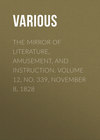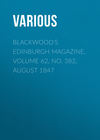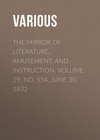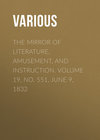Loe raamatut: «The Mirror of Literature, Amusement, and Instruction. Volume 12, No. 339, November 8, 1828», lehekülg 7
The Gatherer
A snapper up of unconsidered trifles.
SHAKSPEARE.
QUID PRO QUO
A canon of the cathedral of Seville, who was very affected in his dress, and particular in his shoes, could not in the whole city find a workman to his liking. An unfortunate shoemaker to whom he applied, after quitting many others, having brought him a pair of shoes which did not please his taste, the canon became furious, and seizing one of the tools of the shoemaker, gave him with it so many blows on the head, that the poor shoemaker fell dead on the floor. The unhappy man left a widow, four daughters, and a son fourteen years of age, the eldest of the indigent family. They made their complaints to the chapter; the canon was prosecuted, and condemned not to appear in the choir for a year.
The young shoemaker, having attained to man's estate, was scarcely able to get a livelihood; and overwhelmed with wretchedness, sat down on the day of a procession at the door of the cathedral of Seville, in the moment the procession passed by. Among the other canons he perceived the murderer of his father. At the sight of this man, filial affection, rage, and despair got so far the better of his reason, that he fell furiously on the priest, and stabbed him to the heart. The young man was seized, convicted of the crime, and immediately condemned to be quartered alive. Peter, whom we call the cruel, and whom the Spaniards, with more reason, call the lover of justice, was then at Seville. The affair came to his knowledge, and after learning the particulars, he determined to be himself the judge of the young shoemaker. When he proceeded to give judgment, he first annulled the sentence just pronounced by the clergy; and after asking the young man what profession he was, "I forbid you," said he, "to make shoes for a year to come."
When Demetrius conquered the city of Magara, and every thing had been plundered by his soldiers, he ordered the philosopher Stilpon to be called before him, and asked him whether he had not lost his property in this confusion? "No," replied Stilpon, "as all I possess is in my head."
LORD MAYOR'S DAY
A country gentleman, much averse to city revelry, made the following couplet:
Music hath charms to sooth the savage beast,
And therefore proper at a city feast.
A city gentleman, who had laid up a store of wealth, replied:—
The chink of gold with gold, transporting sound!
Exceeds the Timbrel, or the Syren's voice
Harmonious, when collective plates go round,
And Hock and Turtle make the heart rejoice.
An inveterate sportsman, hearing early his favourite cry of beagles from the wood, exclaimed:—
Hark, friend, what heavenly music meets the ear;
Haste, farmer, we shall lose it all, I fear.
The rustic, who dreads hounds over his new-sown wheat, replies:—
Music! I cannot hear it for the noise
Of those curs'd dogs, loud shouts, and bellowing boys.
Antigonus, being in his tent, heard two soldiers, who were standing outside, speak very disrespectfully of him. After he had listened some time, he opened the tent and said to them, "If you wish to speak thus of me, you might at least go a little aside."—Sulzer.
A supplementary number of the Mirror, containing the "Spirit of the Annuals," with a fine engraving, will be published with our Number on Saturday, November 15."
Purchasers of the Mirror, who may wish to complete their sets are informed, that every volume is complete in itself, and may be purchased separately. The whole of the numbers are now in print, and can be procured by giving an order to any Bookseller or Newsvender.




















